#<- the op is mentally ill.
Explore tagged Tumblr posts
Text
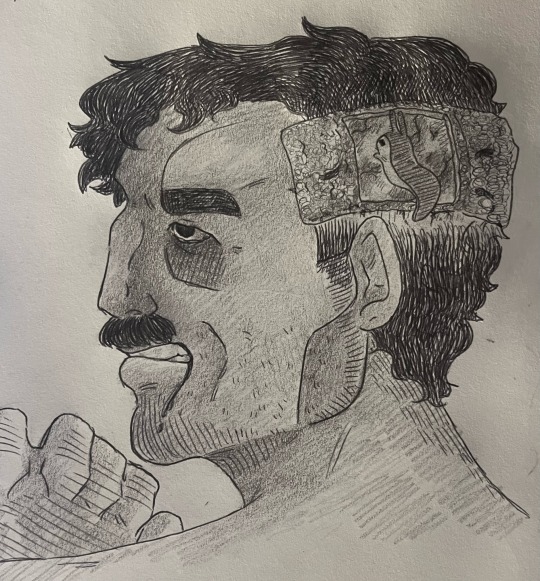
Am rewatching ASO cus I love it a whole lot and got to the brain surgery scene again. I love how fucking unhinged this season is, genuinely. Let’s just do brain surgery!!!!! Why not!!!!!!!!!!!!!
#my art#described#tw: brain surgery#tw: gore#tw: head trauma#tw: blood#????????????????????#pls lemme know if there’s more tws yall need I’m more than happy to provide!!!#dimension 20#a starstruck odyssey#skip takamori#norman takamori#Skip just wormin around in Norman’s brain: ‘I’m helping! :)’#but also rewatching made me realize something that I’ve been going insane about. so like. my guy barry 6 JUST realized 9 was probably A Slug#he n Skip have that conversation that’s genuinely so sweet and kind. and 6 literally trusts Skip so much that after having JUST realized 9-#-acted as he did because he was probably slugged. 6 still fuckin offers to Skip like. ‘hey if something goes wrong and norm beefs it-#-you can come in here with me and we can share my body for a bit okay?’#LIKE AUGH OW WHAT HOW AM I SUPPOSED TO BE NORMAL ABOUT THAT. HE TRUSTS SKIP SO MUCH???????!!!!!!!!! ROAUGH.#<- the op is mentally ill.#the relationship between a clone and a slug is something that can be so personal.#feel like that can be literally be said with all Skip’s relationship. a clone and a slug. an android and a slug.#a 30 y/o short king in massive debt and a slug. a rogue businesswoman and a slug. a psychic enby aguatunisian and a slug.#and of course. just the galaxy’s biggest ex-military asshole and the slug sharing his body.#once again I cannot stress enough. a Starstruck odyssey is a GOOD season folks
8 notes
·
View notes
Text
Look, this is what moral OCD is like for me:
I walk past a piece of paper. I don’t pick it up because I had a long day at work and it’s very cold outside. This then becomes my internal monologue:
I didn’t pick up that piece of paper, I should have. Don’t I care about the environment? It’s not my trash, I shouldn’t have to pick it up. But also that’s how these things happen right? We place the blame on others as our environment degrades. It was just a piece of paper, it’s not like it can do that much damage. But also how do I know: I’m not an environmental expert. Maybe stray paper scraps are killing the frogs. You’re literally killing the frogs. You should look up how many frogs die a year so you know how shitty you are-No stop it.
I care about the environment, and I recycle and I joined green activism movements but is that enough? I could be doing more. I should be doing more. I should donate my entire check to charity. But isn’t it self serving to think that my one check could help that much? Do I really think I’m that important, how self entitled and-no stop it, reset! You are obsessing and if you fall for it, you will not eat dinner. Let it go.
Okay it’s just a piece of paper. It’s okay you skipped it this once: it could have had something dangerous on it. Yeah that makes sense. But also, that means I’m putting my own safety over trying to help the environment, which is very selfish of me. I’m just one shitty person: god how could I be so self absorbed. I should have picked up the piece of paper. I’m so selfish, and shitty and-no, no, stop it! This is not helpful. It’s fine.
It’s been a long day and I’m cold, that’s not a crime- no that’s being selfish again, you’re making excuses. You’re just a lazy piece of shit who doesn’t care about others, and selfish and God the fact you’re thinking this much about one piece of paper shows how selfish you are, you care more about if you’re a good person than anything else, you’re a piece of shit, you’re a piece of shit, YOU’RE A PIECE OF SHIT.
I get home and open up Tumblr. The first post I see says “if you don’t reblog this post about the environment you’re as complicit as an oil billionaire.” I close my computer and resign myself to looking up the state frog populations until I go to bed.
I don’t eat dinner.
The amount of frogs that die a year is somewhere from 200 million to over 1 billion.
#moral ocd#ocd#scrupulosity#Iz rambles#this is okay to reblog I think people really don’t get it#mental illness#the issue with the social media post is not that it exists or that OP even feels about this issue: the issue is it validates my ocd#I don’t obsess about frogs but that is a bummer stat I do rather like them#obsessive compulsive disorder
13K notes
·
View notes
Text
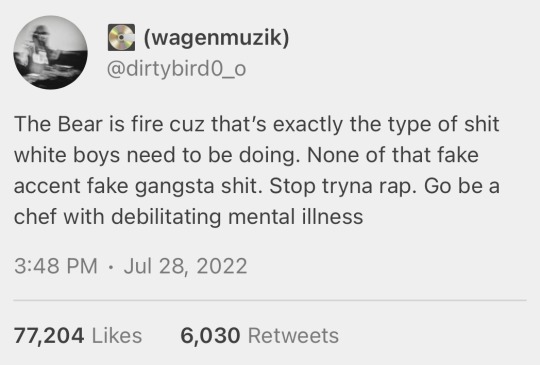
the original got deleted but i finally managed to find a screenshot of the tweet that’s been living in my mind since july of last year
#i literally screamed when i found this again#i quote go be a chef with debilitating mental illness at least once a day in my head i was devastated when op took this tweet down#the bear#carmy berzatto#my txt
50K notes
·
View notes
Text
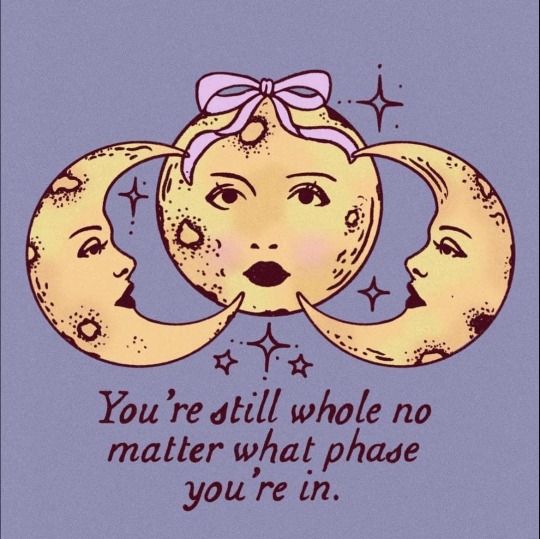
#positivity#love#self love#advice#mental health#mental health support#self care#take care of yourself#op#chronic illness
4K notes
·
View notes
Text
appreciation post for Sabo being fine as hell in this new art style. we EATING
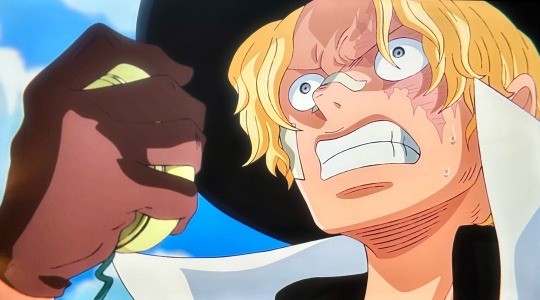
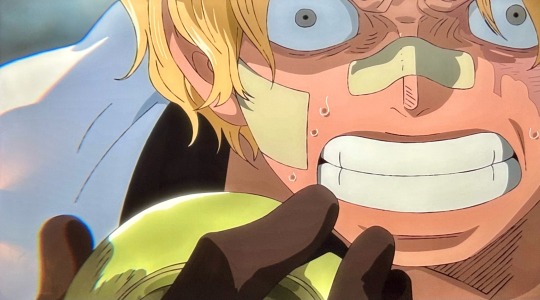

#I also love mentally ill men#my favorite blonde#sabo#revolutionary sabo#one piece#op 1089#he’s so scared and sweaty#he makes stress look sexy#down horrendous
1K notes
·
View notes
Text

opposite au is beckoning me again. can we have our op versions interact with their og versions
#spooky month#spooky month opposite au#og dexter has 91 mental illnesses and is banned from most public spaces#op dexter has 91 mental illnesses and is allowed in most public spaces
217 notes
·
View notes
Text
not to be that zosan girl but what if sanji hates the smell of iron/steel/metal cz it reminds him of his captivity in the dark germa dungeons and then he boards into the going merry and a certain swordsman probably smells like steel and iron and metal and reminds him of everything sanji hates remembering but then the same swordsman shows him how loved, protected and valued he is by shoving him out of the way and risking his own life for sanji in thriller bark and like no wonder sanji is clinically insane
#if i was sanji id be living in the mentally ill street#maybe the zosan girls are onto something yall ngl#time to start reading zosan fics cz wtf is going on here#u got a green haired man and a blonde haired man now make em kiss#one piece zosan#op zosan#zosan#one piece
165 notes
·
View notes
Text
Reason to Live #11425
A few random strangers gave you kudos on a fanfic story you worked so hard on for months, therefore you must write another chapter. – Guest Submission
(Please don't add negative comments to these posts.)
152 notes
·
View notes
Text

been having croc backstory brainrot recently
@crybabykolby and i might write a fic about it idk 👀
#the brainworms are real#he bit the other girls that called him scary btw#skip draws#one piece#sir crocodile#op crocodile#and yes btw we're giving him SO much mental illness
348 notes
·
View notes
Text
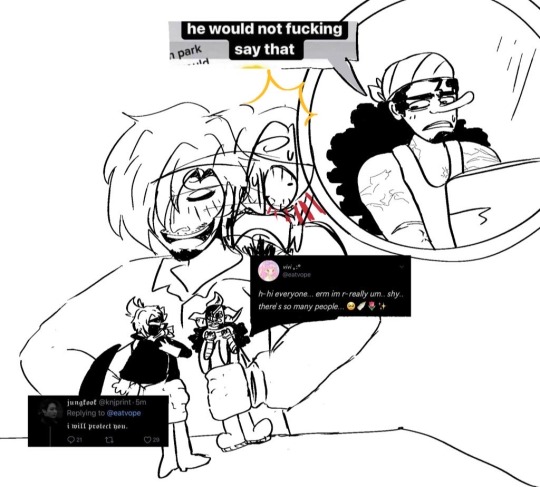
early bird activities
#op#one piece#sanuso#usosan#sanji#usopp#sogeking#soba mask#stealth black#sogesoba#god usopp#black leg sanji#vinsmoke sanji#my art#mintart#SORRY THE QUALITY SUCKS I DID THIS DURING CLASS#DID NOT EXPECT TO CLEAN IT UP LATER BUT IT WAS RLY SILLY AND I WANTED TO SHARE IT BHGFKSDJ#he found the action figures usopp made for chopper im crying#sanji being an early bird and getting to be a lil cringe before everyone wakes up forgetting that#usopp is an insomniac and decides to give up on sleeping some days#WHY IS HE LIKE THIS!!!!!#thanks percy for the mental image of sanji setting up a romantic dinner IM CRRYINGGGG I HATE HIM#plsssss someone needs to draw that or ill do it UGHH I WISH I COULD PROJECT A MENTAL IMAGE USING MY BRAIN ALONE#he's soooooo#we all know usopp can't be weirded out by this because if he had access to the internet at a young age he'd be roleplaying on amino
236 notes
·
View notes
Text
CoD fandom stop being ableist towards Frank Woods challenge (impossible)
Not only do I see posts from people whining about how basically “Woods is useless now” but I even saw someone draw him without his wheelchair and standing upright
If you can’t draw wheelchairs, either learn to do it or don’t draw the character at all; wheelchairs aren’t even hard to draw in the first place either, you’re just ableist and lazy
Love how notable it is that everyone’s now treating Woods like a useless burden when what happened to him wasn’t even his fault and also… that’s completely untrue because disabled people are still able to do plenty of shit (not to mention, that sentiment is as ableist as you can get because it stinks of eugenics)
Reminds me of how real life veterans are treated after not only physical injuries that result in them becoming physically disabled but also mental trauma that result in them becoming mentally disabled/ill; if you don’t view real life veterans as useless burdens, why would you view Woods as one?
#call of duty#black ops#black ops 6#frank woods#‘it’s a fictional character’#and fiction can be based on reality#also if you’re ableist towards a fictional character#you absolutely have the ability to be ableist towards real life people#believe me i’ve seen this one person talk about alex mason being a faker#and then they were like ‘oopsie poopsie i forgot he’s actually mentally ill’#it’s literally impossible to forget that because that’s a central theme of the game#also to call him a faker is incredibly damaging because real life people are called fakers all the time!!!
187 notes
·
View notes
Text
sanjis so funny to me because hes extremely persistent in proving his masculinity to the point where its pretty toxic but as soon as a woman even looks his way hes either arched on the floor, rolling, drooling, panting and moaning (or all of them together) like a freak in heat, what is wrong with him






#jk ik whats wrong with him#hes mentally ill#one piece#op sanji#one piece sanji#black leg sanji#vinsmoke sanji#sanji#onepiece#just admit youre a bottom dude#bros always in heat or something its no wonder fanfic writers always default him to an omega in fics cus damn calm ur shit dude
60 notes
·
View notes
Text


Rob Lucci, government agent and the physical embodiment of [Aggressive Finger Guns]
#dont try anything funny these bad boys are LOADED#once again my best work is inevitably done on stickynotes at a coffee shop#also. man. im midway through Wholecake island now but mentally im still in water 7#sometimes i think ill never leave (affectionate)#rob lucci#rob lucci one piece#cp9 one piece#cp9#cp0#one piece cp0#cp9 rob lucci#op paulie#paulie one piece#galley la#water 7#water 7 spoilers#enies lobby#hattori one piece#artists on tumblr#one piece#lmao i left this in my drafts for too long and now im at egghead
95 notes
·
View notes
Text

Not only do I beat up NPCs and drive around in classic cars in gmod, but I also make ragdoll's of my favorite characters kiss :)
80 notes
·
View notes
Text
I hope that this winter season brings you healing and peace. 🩵❄️
#positivity#love#recovery#chronic illness#mental health support#self love#take care of yourself#self care#mental health#op
173 notes
·
View notes
Text
Abuse, Silence, And Why Kevin Can Fuck Himself
I recently finished watching Kevin Can Fuck Himself on Netflix, and, aside from being the most brutally honest portrayal of domestic abuse I have ever seen, I discovered a beautifully written examination of narrative as power and silence as abuse and how this manifests in our larger culture.
Without going into too much detail, the show is filmed in two distinct styles that are interleaved throughout each episode to tell a cohesive story. Allison and Kevin’s relationship as seen by the rest of the world is told through a multi-cam, laugh-track sitcom that depicts a very typical “goofy husband, shrewish wife” mainstream comedy. Allison’s life through her own eyes is told through a single-cam drama/thriller about Allison planning to murder Kevin to escape his abuse.
It’s an absolute masterclass in screenwriting, but more than that, every episode explores the difference between truth, fact, and reality, and how none of these things are quite as much or as little as story. But while the process of transforming the chaotic and plotless reality of life into a story is as involuntary and essential as breathing, misogyny and the degradation of women is just as ubiquitous in our society, and a story that exists at the expense of another person’s lived reality is a refutation of their humanity.
It's also just a great show for anyone who likes to engage with history (or reality TV or true crime or “real life stories” in general), because while we have to tell ourselves stories about her own lives, we have to tell ourselves stories about other people as well. Eternal silence is narrative death, and the perpetual silence of an unspoken narrative is often the last death we can visit on someone whose story we’d rather ignore.
I also pulled up some books – Lolita and Disgrace – that dealt with similar themes, but from the perspective of the abuser. And what strikes me the most is that, across three beautifully written stories about narrative and silence within a culture that normalizes abuse, Allison, who began her story within a state of narrative death, was the only point-of-view character who had any chance of surviving.
One of the main themes of Kevin is that a compelling story is often a story that reinforces what we already believe or like to believe, and while the story may be factual and true it often also exists at the expense of someone's lived reality. The exact same series of events can be a silly joke or a harrowing tale of abuse depending on the lens through which we view it, but historically we've only been willing to see the multicam, laugh track, sitcom perspective on unbalanced relationships.
The alchemical process of turning a series of disjoint facts and experiences into a narrative creates something new and compelling, and erases much of what previously existed. In this way, it’s entirely irreversible. We spin our experiences into a very thin thread, a story we can tell ourselves that elicits something within us, something we need in order to live with the complex, uncertain, and unsatisfying reality of life. In think in many ways the thing we elicit in ourselves is truth. But truth is both more and less than fact, often more a reflection of our own beliefs and desires than the events of our lives. And in telling that truth we may never stray from the facts, but we almost by definition cannot give voice to another person’s reality.
There's a scene in season 2 of Kevin when Allison is hit by a door – a la the classic excuse – because of Kevin’s carelessness. And while he absolutely did not hit her, the way it's written is such an incredible allegory for how Kevin has curated their story and curated their friends' and family’s perceptions of their story such that even if she tells everyone the exact, unvarnished truth of what's happening to her and begs for help, they will only be capable of seeing the laugh-track, sitcom, “Kevin is a harmless goofball and his wife is a total shrew” perspective on the events of their lives.
As so often happens with abuse, their friends and family saw Allison being hurt because of Kevin. But the alchemy of creating a narrative around Kevin and Allison is irreversible, and the series of events they witness can only be spun together to a joke, an accident, a silly, childish mistake. Allison’s reality, Allison’s pain and fear, is completely elided. Like a lost sound in the middle of a sentence, her experience goes silent, and their larger understanding of her relationship never has to change. And you feel so acutely how Allison lives her entire life in that silence.
Storytelling is human, it’s essential, there’s no other way to engage with our own lives. And it’s not lying. It’s never lying to tell the truth. But it doesn’t reflect every reality, either, because another person’s reality can’t be reflected within our own narrative, because that’s what it means to be another person. To spin two different threads.
And because narrative is the essential process by which we understand our reality, denying someone their own narrative, or denying that this narrative be heard, is inherently abusive. To allow someone a voice is to give them humanity, and to suppress it is to strip that humanity away.
Disgrace, by J.M. Coetzee, follows the story of a professor, David, who rapes a student and then fails to protect his daughter, Lucy, from being raped by intruders in their home. He destroys his daughter’s life – not through failing to protect her, but through twisting her rape into a story about why the rape of his student wasn’t wrong. The main theme of the book is generally considered to be exploitation, but Coetzee doesn’t deal with the exploitation of the rape. That’s too direct, too immediate, too easy for the reader to understand as misogynistic and wrong. Rather, Coetzee delves into “the innocuous-seeming use of another person to fill one's gentler emotional needs” (Ruden).
The rape is how we understand David as a fundamentally exploitative person, a person who denies others their humanity by converting them into a vessel for his own desires, who erases their voice in order to speak through them and give himself the things he needs. And that’s how we recognize that the way he absorbs and claims the stories of his daughter and his student is another kind of violation of their humanity. Another way of turning women into vessels for men’s pain and fear and need.
What’s fascinating is that David's student finds her voice – files a complaint against him – and is eventually able to continue with her life. The woman he raped is less damaged by him than his own daughter, because she was the woman he couldn’t permanently silence.
In Lolita, another brilliant novel about abuse, dehumanization, and storytelling, Humbert turns to the reader at the end and says, “Imagine us, reader, for we don’t really exist if you don’t.”
It’s not that Humbert knew he was fictional, but that he knew everyone was fictional. Believed the entire world only truly existed in his own mind, because anything beyond that was irrelevant to his needs. He coped with the collapse of his ability to dehumanize Dolores (who he called Lolita) by demanding that his voice be resurrected. Demanding immortality. Demanding his narrative exist in another person’s world, and thereby be given the existence and humanity that Allison and Dolores and Lucy and David’s student were denied.
Pushing his needs, finally, onto the reader, because we are the only person he has left, and a person like him can only exist through the use of another. In that way, Humbert was powerless. In that way, Kevin and David were powerless, too.
In Disgrace, David’s dream is to write an opera, and at the end of the book he realizes he’ll never finish his magnum opus. He’ll never be able to terminate the process of converting himself, his world, into a story. But he does learn to decenter himself in that narrative. And it’s when he loses all fear of death, and any conception of the self, that he gains the ability to give dogs – who he generally equates to women – a voice within his opera, his life’s work.
It’s in death that we discover our true unimportance as human beings, that we learn to let go of vanity and our conception of the self entirely. And David had degraded women so thoroughly in order to justify how he used them to meet his own emotional needs that it was only in losing all value for his own life that he could gain the ability to see them as equal voices. To actually put those voices into his own life story. It's at the cost of himself that he allows other people to truly exist, in the death of the self that he finally allows the world to exist outside of himself. It’s almost a positive character arc. Almost.
When Kevin finally loses the ability to abuse Allison, he, like many abusers, loses all desire to live. His world was built on a structure of superiority and inferiority, on beings and vessels, on the inherent value of men and the inherent meaninglessness of women’s lives. The system on which he based his entire reality has been destroyed by Allison’s declaration of the self. And, if he was a being because she was a vessel, then in losing the ability to treat her as a vessel, to fully and completely dehumanize her, he has lost his own humanity.
It may be perfectly summed up here: “Become major. Live like a hero. That's what the classics teach us. Be a main character. Otherwise, what is life for?” (Coetzee).
If you’re not to be a main character, if there indeed is no split between major and minor characters, between people and the paper dolls that populate their story, between living beings and the vessels into which they pour their need – what is life for?
Nothing. At least, not for people whose narrative must exist at the expense of another.
And that’s why I say that only a narrator like Allison could survive this kind of story. Despite beginning her story trapped in eternal silence, her reality fully elided no matter how immediate and obvious it became, Allison was the only point-of-view character of any of these three stories who didn’t establish her power through the degradation of another. Who didn’t conceptualize the world via being and vessels. Whose narrative didn’t exist, by necessity, at the expense of another person’s humanity. Whose thread could exist in a larger tapestry without destroying her sense of self.
Don’t get me wrong, she’s not generally a likable character. She’s misogynistic, cruel, selfish, jealous, desperate, afraid, and in pain. Like anyone in an abusive relationship, she’s not at her best, and she’s often pushed to do things that are ugly and disturbing because she’s simply been pushed too far.
But, for me, the power in her character is in how her last scene never felt like a final scene. Her story didn’t have to be killed, her conception of the self didn’t have to be killed, in order to reveal the brutal reality of stories twisting and intertwining without any inherently superior truth or narrative among them. Allison’s story was one of declaring herself. And that’s why it didn’t feel like it ended at the end. Instead, this felt like a beginning.
#this is probably the most egregious 'post that no one asked for' that I've ever written#but man this show HIT me y'all#and then I went back and reread parts of disgrace and that hit me too#it also made me reconsider my online presence and how I myself engage with narrative in the very small little world I'm a part of#I caught some shit a while ago and made a conscious decision to never comment on the narrative around mental health#and to be clear I was just talking about a general narrative in society at large I wasn't bringing up anything specific or attacking people#more how larger social narratives filter into and sometimes come to define individual stories#but it was upsetting to people and I figured instead I can just try to express a compassionate perspective on the mentally ill myself#but now I wonder if I've gone too far#idk without naming any names I'm getting unblocked by people who should definitely still find my mindset intolerable to their worldview#and I don't blame them because we all have reasons for the things we believe and we're all just doing our best#but it's a canary in the coal mine#it makes me think I've become so focused on not ruffling feathers that I'm tacitly approving some disturbing beliefs#and I think I could have happily ignored that if I hadn't just watched this show#posts that no one asked for#kevin can fuck himself#kevin can f*** himself#op#longer rambles
68 notes
·
View notes